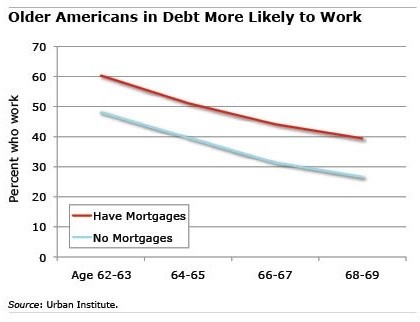Pay Down the Mortgage Before Retirement Pros and Cons
Post on: 20 Март, 2017 No Comment

Pros and Cons of Paying Down the Mortgage Before Retirement
Should you pay off your mortgage before retirement? Most likely, the answer is yes. ImageSource/GettyImages
If you have the financial assets to pay off your mortgage early, but choose not to do so, you are in effect choosing to invest with borrowed money. This would make sense if, after considering risk and taxes, the rate of return on your invested assets exceeds the interest cost of your mortgage. For most people, this is not the case.
Pros To Paying Off Your Mortgage
One of the pros to paying off your mortgage is that it is a guaranteed, risk-free return. You can invest in safe, risk-free investments like bank-insured certificate of deposits and treasury securities. but rarely will you earn a higher return on these types of investments than the interest rate you pay on your mortgage.
If you are willing to take risk, and approach investing with a long-term perspective. you would need to invest your money in stocks (preferably stock index funds ) to have the best chance of earning a return that will exceed the cost of your mortgage.
In doing this you are borrowing money from the bank to invest it in the stock market; a strategy fraught with risk — the primary risk being the mismanagement of those investments. Average investors earn below average returns in the market because they make emotional, not rational, investing decisions .
Study Concludes Most Retirees Should Pay Off Their Mortgage
After considering the amount of risk an investor would have to take to be reasonably expected to earn a return higher than the cost of their mortgage, the Center For Retirement Research concluded in their study titled Should You Carry A Mortgage Into Retirement that when looking at retired households “all except this small minority will be better off repaying their mortgage.” The small minority they were referring to was willing to invest an amount in stocks that was equal to or exceeded the amount they borrowed for their mortgage.
This study looked at both risk and taxes and concluded that most retired people would be better off paying off their mortgage if they had the financial assets to do so.
Cons to Paying Off the Mortgage
The biggest con to paying off the mortgage early is reduced liquidity. It is much easier to access funds sitting in an investment account or bank account than to access funds in the form of home equity. Consider establishing a home equity line of credit once your mortgage is paid off so you have additional liquidity, or access to your funds if needed.
What Assets Should You Use To Pay Off Your Mortgage?
If you are retired, and want to pay off your mortgage early, how do you go about liquidating assets to do so? In the following order:
- First liquidate risk-free investments in taxable accounts. Why? You are essentially trading one risk free investment for another; a bank savings account for a non-mortgaged home, for example.
- Second, liquidate riskier investments in taxable accounts. Here you are cashing in investments that have the potential to earn higher returns and trading them in for a home that is owned free and clear.
- Third, if you are over age 59 you can consider withdrawing investments from tax-deferred accounts to pay off a portion of your mortgage, but be cautious about doing this.
Withdrawals from tax-deferred accounts are included in your taxable income in the year you take the withdrawal. This means if you take a large chunk of money out of an IRA or 401k, the extra income could bump you into a higher tax bracket.
You can potentially avoid this by breaking up large withdrawals into smaller increments to be withrawn over several calendar years.
Before paying off your mortgage early you will also want to consider the tax impacts of your mortgage.














